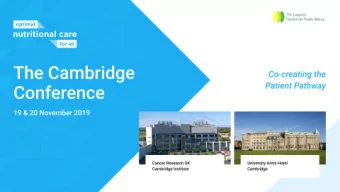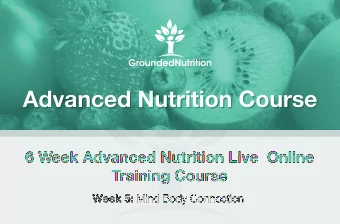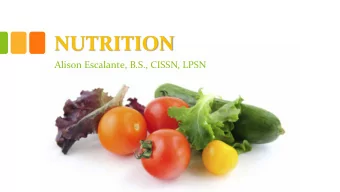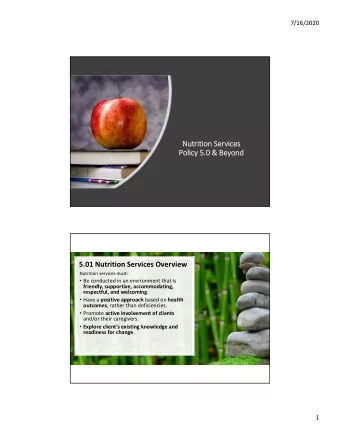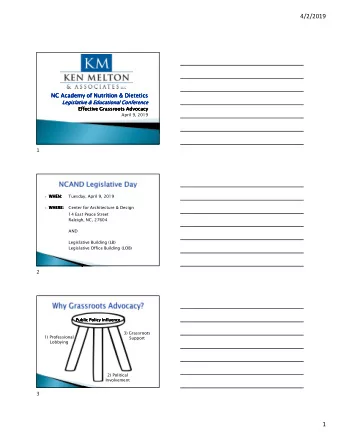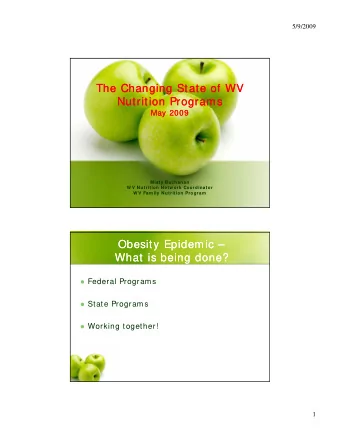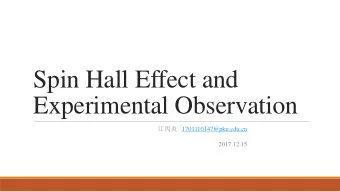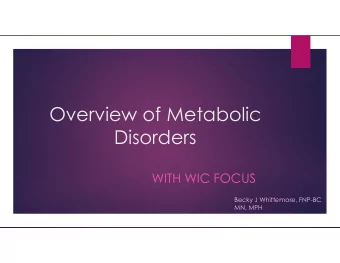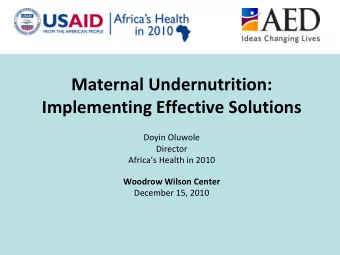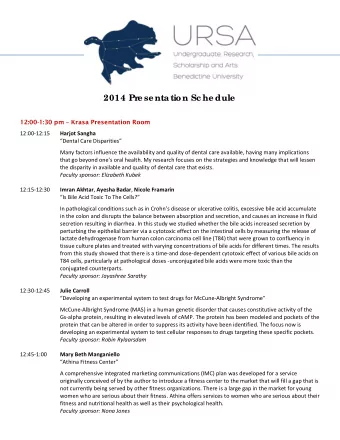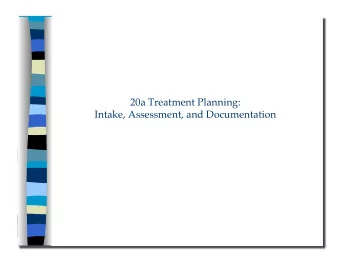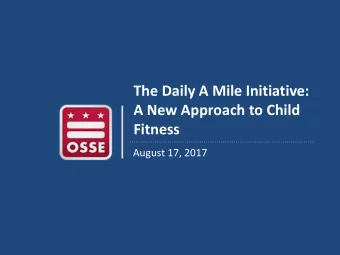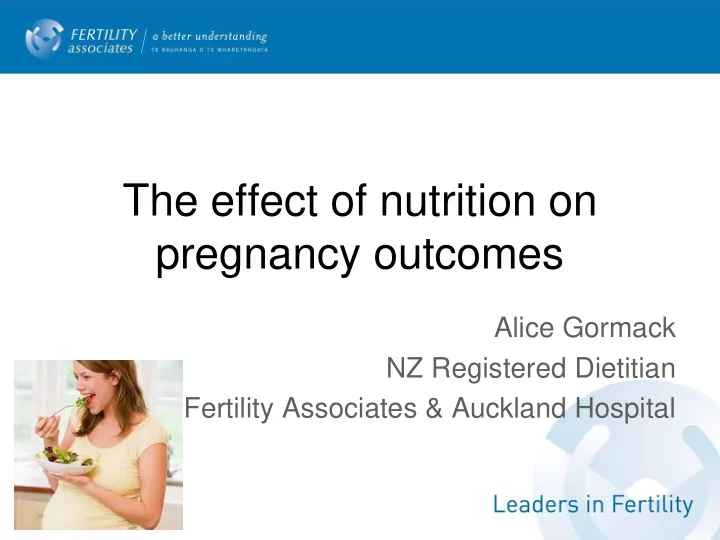
The effect of nutrition on pregnancy outcomes Alice Gormack NZ - PowerPoint PPT Presentation
The effect of nutrition on pregnancy outcomes Alice Gormack NZ Registered Dietitian Fertility Associates & Auckland Hospital Disclosure Attendance funding gratefully received from Fertility Associates (employer) Outline Background
The effect of nutrition on pregnancy outcomes Alice Gormack NZ Registered Dietitian Fertility Associates & Auckland Hospital
Disclosure • Attendance funding gratefully received from Fertility Associates (employer)
Outline • Background – the impact of preconception and gestational nutrition • Nutritional problems in NZ • Nutrition and lifestyle factors that affect fertility • Diet and lifestyle recommendations for planning a pregnancy and for pregnant women – Nutrition advice for GP patients
Pre-conception maternal nutrition • Maternal nutritional intake and status prior to pregnancy is important – Ideal to enter pregnancy with adequate body stores/levels – Decrease potentially risky lifestyle choices: • Alcohol intake • Inappropriate nutritional supplementation • Medication or drug use – Nutrition and lifestyle appear to affect fertility – Nutrition affects the health and wellbeing of the offspring in later life
Gestational nutrition • What a women eats during pregnancy affects both maternal and fetal health via: – Adequate fuel and nutrients for optimal fetal growth – Risk of: • food-borne illness • neural tube defects • gestational diabetes • pre-eclampsia • labour and delivery problems – Impact of maternal nutrition on the lifelong health of the child
The Barker hypothesis • “That alterations in foetal nutrition and endocrine status result in developmental adaptations....predisposing individuals to cardiovascular, metabolic and endocrine disease in later life” • Pre-conception and gestational nutrition has permanent effects on the health of offspring
Long-term effects of malnutrition (human studies) Offspring have: Lower birth weight 1, 2 ↑ rate of heart disease and higher BMI ↑ risk of hypertension and T2DM ↑ rate of obesity Higher birth weight 3 ↑ rate of obesity ↑ risk metabolic syndrome and T2DM Maternal ↑ rate of obesity and metabolic disorders hyperglycaemia 4 1. McMillen, I., et al (2008) Basic and Clinical Pharmacology and Toxicology, 102(2): p. 82. 2. Barker, D., et al (1989) British Medical Journal, 298(6673): p. 564-567. 3. Catalono, P et al (2006) British Journal Obstetrics and Gynaecology, 113: p1126-1133 4. Boney, C., et al (2005) Pediatrics, 115(3): p. e290.
The typical NZ diet • Too much: • Not enough: – Saturated fat – Dietary fibre – Sugar (e.g. drinks) – Calcium – Sodium / salt – Iron (women) – Alcohol – Zinc (men) – Selenium 2008/9 NZ Adult Nutrition Survey – Omega-3 fatty acids – Fruit and veges
NZ body weight statistics (by BMI) Females Males • Underweight 2% 1% • Healthy weight 43% 33% • Overweight 29% 41% • Obese 25% 1 26% • Latest figures have obesity at 29% and 28% 2 1. 2006/7 NZ Health Survey 2. Ministry of Health, 2012. The Health of NZ Adults
What diet and lifestyle factors affect fertility? • Alcohol – Heavy intake (>8/week) = decreases male and female fertility – Moderate intake (7-8/week) = unclear effect – Detrimental effect of alcohol in IVF treatment • Caffeine – Most (but not all) studies show a negative effect – Negative effect in IVF populations
• Body weight – Overweight/obese = decreased fertility and fecundability, increased gestational risks, negative effect on fertility treatment – Underweight = decreased female fertility, increased gestational risks • Smoking – Clear negative effects on fertility, gestational and fetal health • Exercise – Potential negative effect of too much vigorous exercise
Micronutrients, dietary intake & fertility • Micronutrients – Little conclusive evidence • Mediterranean diet may be beneficial for fertility (compared with Western-diet) • non-haem iron and higher fat dairy products may risk of ovulatory infertility
Effect of maternal body weight • Low pre-pregnancy BMI (i.e. underweight) • Increased risk pre-term or LBW baby • Poor gestational weight gain is associated with an increased risk restricted fetal growth • High pre-pregnancy BMI (i.e. overweight/obese) – Tend to gain more weight and more fat in pregnancy and have heavier infants – Can have malnutrition due to low-nutrient excess-energy food choices
Recommended weight gain in pregnancy • Dependant on pre-pregnancy BMI – Underweight: 12.5-18kg – Healthy weight range: 11.5-16kg – Overweight: 7-11kg – Obese: 6kg • Important! Discuss appropriate weight gain during pregnancy • Most weight gain should occur in the 2 nd and 3 rd trimester
Prior to pregnancy • Lose weight if overweight or obese – Smaller portions – Eat regular meals (BF, L, and D) – Healthier food and drinks – Exercise / activity • Gain weight if underweight – Larger portions – Regular meals + snacks – unsaturated fat • Add extra oil, margarine, avocado, nuts, seeds – Regular (not excessive) exercise
Advice for patients trying to conceive / who are pregnant: • Eat a wide range of foods daily • Cut down saturated fat • Reduce intake of butter, meat fat, chicken skin, baking, chocolate, takeaways, high fat dairy products, chips, coconut fat/oil • Cut down sugar and increase fibre • Avoid fad diets / detox diets • Be careful with drink choices • Quit smoking! • Exercise most days • Take only evidence-based nutrition supplements
Choose a balanced diet: • Wholegrain carbohydrates (B vitamins and fibre) • Lean protein (iron, zinc, omega- 3’s) – Include regular red meat, oily fish and vegetarian proteins • 5+/day fruit & vegetables (antioxidants and fibre) • Low fat dairy products (calcium and protein) – Fortified soy milk if vegan / lactose intolerant
Drinks • Low sugar drinks – water, low- fat milk, ‘diet’ or ‘zero’ drinks, herbal tea (check varieties), artificially sweetened drinks • Low caffeine drinks – decaf coffee or tea, herbal tea, no energy drinks • No alcohol – As little as possible when planning a pregnancy – None when pregnant (no ‘safe level’ of intake)
Nutritional supplements • Improve food intake, don’t just take pills! • Avoid foreign / homemade supplements • Avoid certain herbs / teas as per MOH list • ‘Any’ nutritional supplement was used by 53% of females, and 42% of males 1 • Most common: – oils – multi-vitamin / multi-mineral supplements – herbal supplements 1. 2008/9 Adult Nutrition Survey
Nutritional supplements for males • There are no recommended nutritional supplements for males trying for a baby • However, antioxidant supplements may be useful for men with sperm problems: • Vitamin C, vitamin E, zinc and selenium may improve sperm • ‘Menevit’ may improve sperm (small IVF study)
Nutritional supplements for females • 800mcg folic acid before conception & for first trimester • Some women require 5000mcg/day: – previous NTD / family history of NTD, obese, T1DM, epilepsy meds • 150mcg iodine (Neurokare) when pregnant and breastfeeding • Kelp supplements are not recommended • OR combined prenatal supplement with adequate folic acid and iodine
• Iron supplement if patient has low iron levels – Best taken in conjunction with vitamin C to boost absorption (e.g. with colourful veges / piece of fruit) – Or can take with vitamin C supplement • Vitamin B12 injection if follow strict vegan diet • Eat dietary sources of omega-3 rather than take omega- 3 supplements • Women with low calcium intake may benefit from 1000- 2000mg elemental calcium to reduce their risk of pre- eclampsia
Summary • Encourage patients to have a well-balanced basic diet prior to, and during pregnancy • Evidence-based nutritional supplements only • Exercise regularly – daily if possible • Lose / gain weight as necessary, appropriate weight gain in pregnancy • Avoid fad diets / excess supplements
Thank you for your attention. Questions?
Recommend
More recommend
Explore More Topics
Stay informed with curated content and fresh updates.
